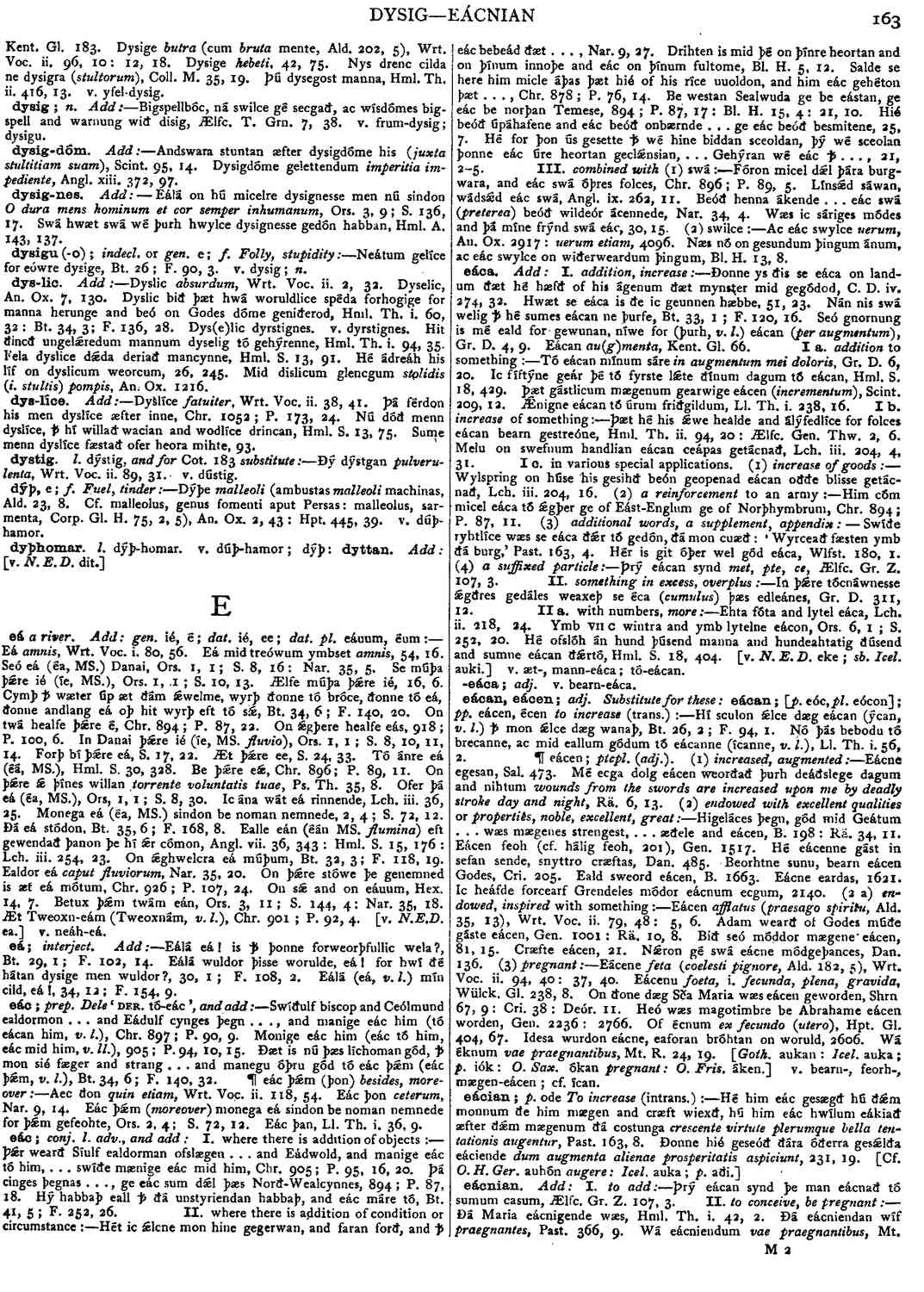eáca
-
Ðonne ys ðis se eáca on landum ðæt hé hæfð of his ágenum ðæt mynster mid gegódod,
- C. D. iv. 274, 32.
-
Hwæt se eáca is ðe ic geunnen hæbbe,
- 51, 23.
-
Nán nis swá welig ꝥ hé sumes eácan ne þurfe,
- Bt. 33, 1; F. 120, 16.
-
Seó gnornung is mé eald for gewunan, níwe for (þurh,
v. l.) eácan (per augmentum ),
- Gr. D. 4, 9.
-
Eácan au(g)menta, Kent. Gl. 66. I a. addition to something :-- Tó eácan mínum sáre
in augmentum mei doloris,
- Gr. D. 6, 20.
-
Ic fíftýne geár þé tó fyrste lǽte ðínum dagum tó eácan,
- Hml. S. 18, 429.
-
Þæt gástlicum mægenum gearwige eácen (
incrementum
),- Scint. 209, 12.
-
Ǽnigne eácan tó úrum friðgildum, Ll. Th. i. 238, 16. I b.
increase
of something :-- Þæt hé his ǽwe healde and álýfedlíce for folces eácan bearn gestreóne,- Hml. Th. ii. 94, 20: Ælfc. Gen. Thw. 2, 6.
-
Melu on swefnum handlian eácan ceápas getácnað,
- Lch. iii. 204, 4, 31.
- I c. in various special applications,
-
Wylspring on húse his gesihð beón geopenad eácan oððe blisse getácnað,
- Lch. iii. 204, 16.
-
Him cóm micel eáca tó ǽgþer ge of Eást-Englum ge of Norbhymbrum,
- Chr. 894; P. 87, 11.
- Swíðe ryhtlíce wæs se eáca ðǽr tó gedón, ðá mon cuæð: 'Wyrceað fæsten ymb ðá burg,' Past. 163, 4.
-
Hér is git óþer wel gód eáca,
- Wlfst. 180, 1.
-
Þrý eácan synd
met, pte, ce,
- Ælfc. Gr. Z. 107, 3.
-
In þǽre tócnáwnesse ǽgðres gedáles weaxeþ se éca (cumulus) þæs edleánes, Gr. D. 311, 12. II a. with numbers,
more
:-- Ehta fóta and lytel eáca,- Lch. ii. 218, 24.
-
Ymb vii c wintra and ymb lytelne eácon,
- Ors. 6, 1; S. 252, 20.
-
Hé ofslóh án hund þúsend manna and hundeahtatig ðúsend and sumne eácan ðǽrtó,
- Hml. S. 18, 404.
Bosworth, Joseph. “eáca.” In An Anglo-Saxon Dictionary Online, edited by Thomas Northcote Toller, Christ Sean, and Ondřej Tichy. Prague: Faculty of Arts, Charles University, 2014. https://bosworthtoller.com/43193.
Checked: 0